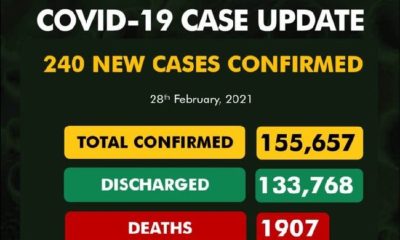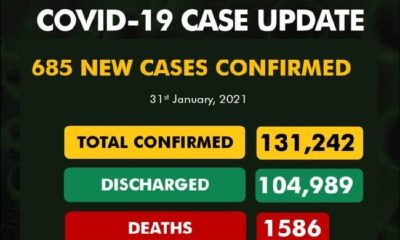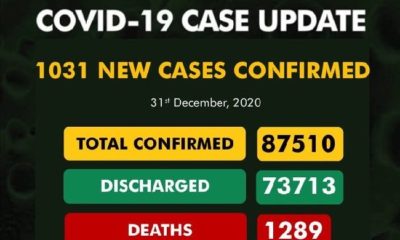Nigeria News
Nigeria From 1966-1970: The American Files Are Not From Heaven (Part II)
By Henry Chukwuemeka Onyema
Awoyokun asserts that if it were not for the ‘Igbo’ coup of January 15 the massacres of the Igbo in Northern Nigeria six months later would not have occurred. This thesis arises from his criticism of Achebe’s location of the massacres in resentment and blame of the Igbo for any problem in Nigeria. Permit a verbatim quote from Awoyokun in part 3 of TheNEWS magazine trilogy (p.16):
“To Achebe, the final straw that led to the secession was the alleged 30,000 Igbos killed in the North. He carefully structures the narrative to locate the reason for this systematic killing/pogrom/ethnic-cleansing in the so-called usual resentment of the Igbo and not from the fallout of the first coup in the history of Nigeria. Achebe dismisses the targeted assassinations as not an Igbo coup. The two reasons he gives are because there was a Yoruba officer among the coup plotters and that the alleged leader of the coup, Major Chukwuma Kaduna Nzeogwu was Igbo in name only.”
“Not only was he born in Kaduna, the capital of the Muslim North, he was widely known as someone who saw himself as a Northerner, spoke fluent Hausa and little Igbo and wore the Northern traditional dress when not in uniform.” page 79 of There Was A Country.
So what is the truth? Where do we draw the line between opinion and fact? Not a few writers such as Nowa Omoigui and D. J. M. Muffet take the position that the first coup ignited the massacres and the July 29, 1966 coup.
Before examining the January coup I must ask Awoyokun and those who share his position: why were the Igbo the primary target of the 1953 Kano Riots? Southern-Yoruba, Igbo, Niger Delta-politicians argued for independence in 1956 as against the Northern demand for independence as soon as practicable. Southerners, not only the Igbo, reacted hostilely to the Northerners’ carrying the day at the end of proceedings in the Legislative Chamber in Lagos. Chief S. L. Akintola, the chieftain of the dominantly Yoruba party, Action Group, set for a rather provocative tour of Kano shortly afterwards. Though the tour was called off the violence was not. In his autobiography ‘The Story of My Life’ Sir Ahmadu Bello stated: “Here in Kano, as things fell out, the fighting took place between the Hausas…and the Ibos; the Yorubas were oddly enough out of it.”
It is clear that it was not in 1966 that the ritual of killing the Igbo in the North at the slightest whim started.
Adewale Ademoyega, a full blooded Yoruba army officer, was deeply involved in the planning and execution of the January coup. His book ‘Why We Struck’ gives insight into the coup’s antecedents; planning; modus operandi and partial success. Any study of January 15 that ignores Ademoyega’s book is incomplete.
Awoyokun insinuates that Odumegwu-Ojukwu was sympathetic to the first coup. Ojukwu’s actions during the coup are really a weird way of showing support for the putsch. In his book Ademoyega who knew Ojukwu wrote: ‘Lieutenant-Colonels Ojukwu and Njoku were unsure and preferred to adopt the ‘‘if you boys succeed, we shall go along with you’’ attitude.’ (p.51). In the run-up to the coup many Nigerian military officers, including Ojukwu (by his own admission: see his interview with ‘Newswatch’ magazine of 28 September 1992), were aggrieved with the way the country was being run to the extent that some of them considered a coup. Interestingly, some of them were among the casualties of the January coup. In a September 5, 2010 interview with ‘The Nation’ newspaper, Matthew Mbu, then a Junior Defence Minister, narrated how, at an Air Force base in Kaduna on an official assignment on 5 January 1966, he was bluntly told by Brigadier Samuel Ademulegun that the military was going to sack the government. Ademulegun made no bones about their plan to shoot key members of the political class, notably Chief Okotie-Eboh, the Minister for Finance.
Much has been made of the non-killing of Igbo members of the political class; that no coup was carried out in Enugu; and Ifeajuna tipped off President Nnamdi Azikiwe. Till date, in certain circles, despite overwhelming evidence to the contrary, the killing of Lieutenant-Colonel Arthur Unegbe is attributed to his possession and non-surrender of the Lagos armoury keys to the plotters. Some scholars of the coup even argue that no Igbo was killed. They describe Unegbe as a Mid-Westerner from Anioma. I wonder if the Anioma are not a major part of the Igbo stock west of the River Niger in present day Delta State. Frankly, I fell for this line of thought till, after the online and print publication of my article on the coup titled ‘The Shot that shook the nation,’ a townsman of Unegbe’s emailed me to inform me that the Colonel was from Ezioha village in Ozobulu in present day Anambra State.
Those who argue that Unegbe would have been spared if he handed over the armoury keys and that he was not on the plotters’ list are perpetuating a myth. Not surprisingly, this myth is rooted in the pro-Northern Federal Government accounts of the coup within the crisis period of 1966-1967. The facts are different.
By January 1966 Unegbe was the Quartermaster-General of the Nigerian Army. This post is an army’s administrative live wire as its holder is responsible for its entire supplies from pens to pistols. He is not in charge of any combat unit so he has no business with the armoury, though he stocks it. The Oxford Advanced Learner’s Dictionary defines a Quartermaster as ‘an officer in the army in charge of providing food, uniforms and accommodation.’ As professional soldiers the plotters knew this. Going by the accounts of Ademoyega and Gbulie who wrote ‘Nigeria’s Five Majors,’ what the plotters desperately needed were armoured vehicles to consolidate their gains in Lagos on January 15. Major John Obienu, the commander of the Abeokuta-based Second Reconnaissance Squadron, who had what they needed, had initially thrown in his lot with the plotters only to back out on the D-day. Ben Gbulie teased a fellow plotter (who actually had access to the Lagos armoury) that he misplaced his armoury keys in Unegbe’s house following the coup.
The fact is that given his sensitive position in the army and friendship with some of the pro-Establishment officers who would oppose the coup, Unegbe was a target from day one. In the words of the Police Special Branch report on the coup, one of the objectives of the plotters was ‘the assassination of all senior officers known to be in a position to foil successfully the conspirators’ efforts to topple the governments of the federation.’ In page 60 of his book, Ademoyega mentioned Unegbe as one of the officers he and his colleagues had marked down for arrest.
The Special Branch report that was released by the Gowon regime came into being following the interrogation of the plotters. Its contents go a long way in contributing to the myth that the plotters had no plans for Benin and Enugu, the Igbo political class-dominated regional capitals. Permit me to quote relevant sections of the report’s preamble:
“It has been established that sometime during August 1965, a small group of army officers, dissatisfied with political developments within the federation, began to plot in collaboration with some civilians, the overthrow of what was then the Government of the Federation of Nigeria. The plot which eventually emerged from their deliberations was that on a date not yet decided at that time, the following action would be taken by troops from selected units, led by the ringleaders of the plot: the arrest of leading politicians at Lagos, Ibadan, Kaduna, Enugu and Benin. The plan stipulated that wherever resistance was encountered, the individuals concerned were to be killed…
“Although the original plan stipulated that the action intended by the plotters should take place simultaneously, in all the regional capitals, no arrangement was made to implement these intentions in Benin and Enugu.”
So what actually happened at Enugu? Why didn’t the likes of Michael Okpara and Akanu Ibiam fall like Balewa, Akintola and Ahmadu Bello?
Going by the accounts of the surviving plotters, recruiting officers for the putsch was as delicate as the actual operation. According to Ademoyega, in the North, Nzeogwu as the acting commandant of the Nigerian Military Training College, Kaduna, had success in mobilizing men and resources. Down in the South (West, East and Mid-West), it was far more difficult, especially with the political violence in the West. According to Major Alexander Madiebo, “by October 1965, rumours of an impending coup were already circulating within the country. A circular letter was passed around all army units to alert army commanders to the possibility of a coup.” (P.14 of ‘The Nigerian Revolution and the Biafran War.’). Thus Ifeajuna and Ademoyega, the coup’s linchpins in the South, had to move sneakily.
In the First Battalion in Enugu, only Major Chude-Sokei threw in his lot with them. His operational briefs were Enugu and Benin since Benin had no army formation then. But Chude-Sokei was posted to India for a course so the plotters had to hastily recruit a young Lieutenant Oguchi. (Ademoyega. pp.56 and 69).
A verbatim though lengthy quotation of Ademoyega’s account of what happened on the D-day in Enugu is instructive:
“The story of the Enugu operation was punctuated by a mishap. First, Lieutenant Oguchi did not leave Lagos (he was on a course there) on January 13, as was previously planned, because his military vehicle was not ready. Finally, he left on the 14th but suffered a breakdown on the way. He eventually arrived at Enugu in the early hours of the 15th. He had borne written orders with him from Lagos. However, on his arrival at Enugu, he found the final signal that ordered him to go ahead with the execution of the tasks. He organized a small body of troops with a Land Rover and a 3-tonner.
“He sent a small detachment to the Eastern Nigerian Broadcasting Service (ENBS). This detachment seized the station, stopped the normal programme and ordered the broadcasters to play only military music while awaiting latest news from Lagos. At the same time, Oguchi himself made for the Premier’s lodge. Therein, he found that he had not only the Premier, Dr. Okpara, on his hands, but also an august visitor, Archbishop Makarios, the president of Cyprus who, after the conclusion of the Commonwealth Prime Ministers’ Conference in Lagos on January 12, had arrived in Enugu on the 13th on a state visit. With such a man of international repute present, Lieutenant Oguchi could do no more than bide his time. A couple of hours later when the Archbishop had departed, he placed Dr. Okpara under house arrest, deploying his troops to guard the lodge. He himself went to the ENBS and made a tentative announcement that the Army had taken over power. He stopped at that while he awaited more news from Lagos. Later on, his own troops were replaced by those sent on Ironsi’s orders and Dr. Okpara was transferred to a prison detention. Because of his lateness to start, Oguchi had not yet sent troops to Benin before Ironsi’s men took over.” (Ademoyega. pp.82-83).
An independent source may help sceptics realize that Enugu was not deliberately excluded by the January 15 plotters in order to spare their ‘own’ and kill others; this comes from Matthew Mbu. In his words: “I came back on the 6th of January and went to tell Okpara. Nobody took me serious. It was God that saved Okpara (on 15 January). At the Enugu airport the army boys asked him to alight from his official car. He was waiting for Archbishop Makarios of Cyprus who was visiting Nigeria then.
“He defied the soldiers’ orders and was about to be shot when Sir Francis Akanu Ibiam (Governor of the Eastern Region) grabbed him and forced him from the car.” (‘The Nation’ newspaper, 5 September 2010. p.56).
There are sources that report that Ifeajuna tipped off President Nnamdi Azikiwe. Perhaps one of the most significant is an article in ‘The Guardian’ newspaper of May 18, 1999 in which late M.C. Kafundu Ajuluchukwu, a prominent Zikist in his heyday and one of Azikiwe’s close right hand-men, made the allegation. I have not been able to independently confirm or disprove it but the fact that the President left Nigeria on health grounds shortly before the coup and did not return even for the first Commonwealth conference to be hosted in Lagos was suspicious. If Ifeajuna really gave him the tip-off what did he do with it? But one must not facilely conclude that since both Ifeajuna and Azikiwe are from Onitsha, the former did it to protect his kinsman.
•To be continued tomorrow.
•Onyema is the author of ‘Nigeria from 1966-1970: The American Files Are Not From Heaven,’ a polemical response to the American files on the Nigerian Conflict. Email:[email protected]
——————————————————————————————————————————————-
Posted in Nigeria News. A DisNaija.Com network.
Source: PM News
DisNaija.Com publishes regular posts on Nigeria News, Nigerian Newspapers, Online Nigeria Gist.
Follow us on Twitter and Facebook.
Your Opinion Counts. Be sure To Leave A Comment, If You Have Any.
Please Like, Share or Tweet. Your Support Is Appreciated.

Nigeria News
Kano Transfers Over 1,000 Almajiris To Different States Amidst COVID-19 Pandemic

The Kano State Government on Saturday said it has transferred 1,098 ‘almajiris’ to different states of the country.
The commissioner for local government, Murtala Garo, disclosed this while presenting a report before the state’s task force on COVID-19 at the government house, Kano.
Almajiris are children who are supposed to be learning Islamic studies while living with their Islamic teachers. Majority of them, however, end up begging on the streets of Northern Nigeria. They constitute a large number of Nigeria’s over 10 million out-of-school children.
Mr Garo said the Kano government transported 419 almajiris to Katsina, 524 to Jigawa and 155 to Kaduna. He said all of them tested negative for coronavirus before leaving the Kano State.
Despite the coronavirus test done in Kano for the almajiris, the Jigawa government earlier said it would quarantine for two weeks all the almajiris that recently arrived from Kano.
Mr Garo said another 100 almajiris scheduled to be taken to Bauchi State also tested negative to COVID-19.
In a remark, Governor Abdullahi Ganduje said the COVID-19 situation in Kano was getting worse. He appealed for a collaborative effort to curtail the spread of the virus in the state.
Mr Ganduje, who commended residents for complying with the lockdown imposed in the state, said the decision was taken to halt the spread of the virus.
Kano State, as of Saturday night, has 77 coronavirus cases, according to the Nigeria Centre for Disease Control.
The decision to transfer the Kano almajiris is part of the agreement reached between Northern governors that almajiris in each state be transferred to their states of origin.
However, even before the latest agreement by the governors, the Kano government had been transferring almajiris to other states and neighbouring countries after it banned street begging in the state, most populous in Northern Nigeria.
Despite the transfers, however, no concrete step has been taken to ensure such children do not return to Kano streets as there is freedom of movement across Nigeria although interstate travel was recently banned to check the spread of the coronavirus.
Sourced From: Premium Times Nigeria
Nigeria News
COVID-19: ‘Bakassi Boys’ Foil Attempt To Smuggle 24 Women Into Abia In Container

By Ugochukwu Alaribe
Operatives of the Abia State Vigilante Service, AVS, popularly known as ‘Bakassi Boys’ have arrested 24 market women hidden in a container truck, at Ekwereazu Ngwa, the boundary community between Abia and Akwa Ibom states.
The market women, said to be from Akwa Ibom State, were on their way to Aba, when they were arrested with the truck driver and two of his conductors for violating the lockdown order by the state government.
Driver of the truck, Moses Asuquo, claimed he was going to Aba to purchase stock fish, but decided to assist the market women, because they were stranded.
A vigilante source told Sunday Vanguard that the vehicle was impounded while the market women were sent back to Akwa Ibom State.
Commissioner for Home Land Security, Prince Dan Okoli, who confirmed the incident, said that smuggling of people into the state poses great threat to the state government’s efforts to contain the spread of COVID- 19.
Sourced From: Vanguard News
Nigeria News
Woman Kills Her Maid Over Salary Request

Operatives of the State Criminal Investigation and Intelligence Department (SCIID), Yaba of the Lagos State police command have arrested one Mrs Nene Steve for allegedly killing her maid, Joy Adole
The maid was allegedly beaten to death by Nene for requesting for her salary at their residence located at 18, Ogundola Street, Bariga area in Lagos.
Narrating the incident, Philips Ejeh, an elder brother to the deceased said that he was sad when they informed him that his sister was beaten to death.
He explained that the deceased was an indigene of Benue State brought to Lagos through an agent and started working with her as a maid in January 2020.
‘’She reported that her boss refused to pay her and anytime she asked for her salary she will start beating her.
She was making an attempt to leave the place but due to the total lockdown she remained there until Sunday when her boss said she caught her stealing noodles and this led to her serious beating and death,’’ Ejeh said.
He called on Lagos State Government and well- meaning people in the country to help them in getting justice for the victim.
The police spokesman, Bala Elkana, stated that the woman and her husband came to Bariga Police Station to a report that their house girl had committed suicide.
Detectives were said to have visited the house and suspected foul play with the position of the rope and bruises all over the body which confirmed that the girl had been tortured to death and the boss decided to hang up the girl to make it look like suicide.
He said: “The police moved on with their investigation and found a lot of sign of violence on her body that she has been tortured before a rope was put on her neck.’’
He added that the police removed the corpse and deposited it in the mortuary for autopsy to further ascertain the cause of the death.
Elkana said the matter has been transferred from Bariga police station to Panti for further investigation while the couple have been arrested and will be charged to court.
Tribune
Boko Haram Attacks: Buhari Summons Urgent Meeting Of Service Chiefs

Ostensibly alarmed by the latest killings of dozens of soldiers by Boko Haram insurgents, President Muhammadu Buhari has summoned an urgent meeting of Service Chiefs to find ways to stop the trend.
He has also dispatched the Minister of Defence, Mansur Dan Ali, to the neighbouring Republic of Chad for an urgent meeting with President Idris Deby and his defence counterpart.
Knowledgeable sources said in Abuja on Friday that the president is worried by on the deterioration of security situation on the Nigeria – Chad Border that has led to the recently increased Boko Haram terrorism in the area.
The sources which did not want to be named in Abuja said: “Nigeria has a Chad problem in the Multi-National Joint Task Force (MNJTF) put together to secure the Lake Chad basin areas and repeal the Boko Haram terrorist attacks against all the countries neighbouring the Lake.”
The sources noted that Chad is believed to be having their own internal security challenges and this has reportedly led to their pulling away their own troops manning their own border around Lake Chad, saying: “That lacuna is being exploited by the Boko Haram terrorists, who go in and out of Nigeria, Niger and Cameroon to launch terrorist acts. This is a clear illustration of the fact that terrorism is beyond national borders.”
When contacted, the Senior Special Assistant to the President on Media and Publicity, Garba Shehu, confirmed that the Defence Minister is going to Chad but said he is unaware of the purpose.
Meanwhile, the military authorities are said to be in the process of identifying the families of the latest victims with a view to making contact with them.
Credible sources revealed that it is the reason the president is yet to make any pronouncement on the matter.
“The President has called an urgent meeting with the Service Chiefs, as well as the fact that families of the latest victims of the Boko Haram are being identified and contacts made before a government pronouncement on the tragic attacks. This, it is understood, is the reason for the silence of the government over the incident,” the source said.
Sourced From: Tribune






















